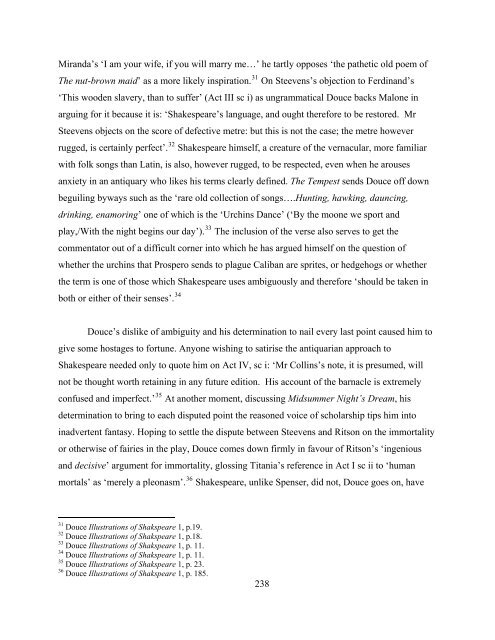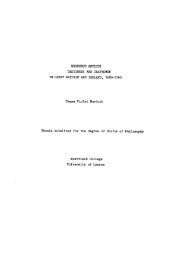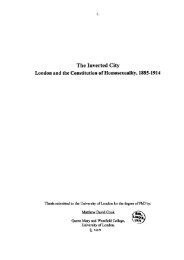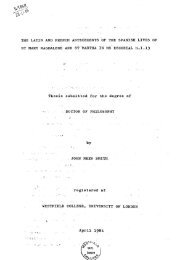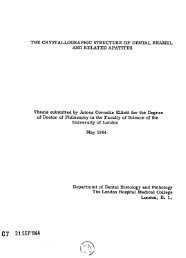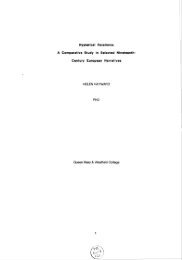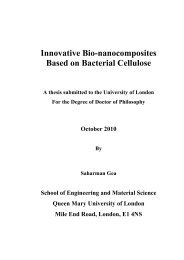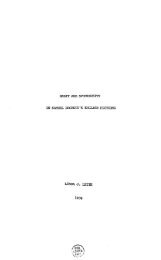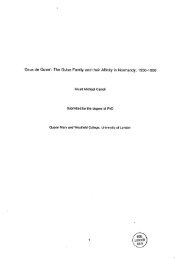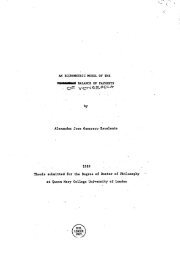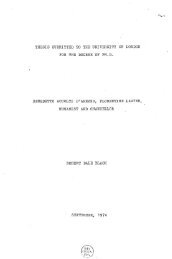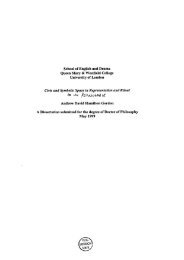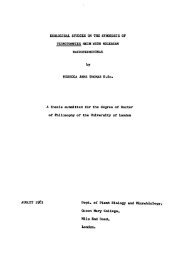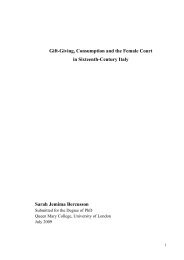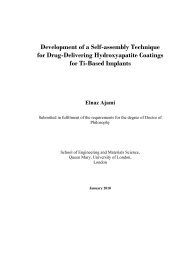Antiquaries in the Age of Romanticism: 1789-1851 - Queen Mary ...
Antiquaries in the Age of Romanticism: 1789-1851 - Queen Mary ...
Antiquaries in the Age of Romanticism: 1789-1851 - Queen Mary ...
You also want an ePaper? Increase the reach of your titles
YUMPU automatically turns print PDFs into web optimized ePapers that Google loves.
Miranda’s ‘I am your wife, if you will marry me…’ he tartly opposes ‘<strong>the</strong> pa<strong>the</strong>tic old poem <strong>of</strong><br />
The nut-brown maid’ as a more likely <strong>in</strong>spiration. 31 On Steevens’s objection to Ferd<strong>in</strong>and’s<br />
‘This wooden slavery, than to suffer’ (Act III sc i) as ungrammatical Douce backs Malone <strong>in</strong><br />
argu<strong>in</strong>g for it because it is: ‘Shakespeare’s language, and ought <strong>the</strong>refore to be restored. Mr<br />
Steevens objects on <strong>the</strong> score <strong>of</strong> defective metre: but this is not <strong>the</strong> case; <strong>the</strong> metre however<br />
rugged, is certa<strong>in</strong>ly perfect’. 32 Shakespeare himself, a creature <strong>of</strong> <strong>the</strong> vernacular, more familiar<br />
with folk songs than Lat<strong>in</strong>, is also, however rugged, to be respected, even when he arouses<br />
anxiety <strong>in</strong> an antiquary who likes his terms clearly def<strong>in</strong>ed. The Tempest sends Douce <strong>of</strong>f down<br />
beguil<strong>in</strong>g byways such as <strong>the</strong> ‘rare old collection <strong>of</strong> songs….Hunt<strong>in</strong>g, hawk<strong>in</strong>g, daunc<strong>in</strong>g,<br />
dr<strong>in</strong>k<strong>in</strong>g, enamor<strong>in</strong>g’ one <strong>of</strong> which is <strong>the</strong> ‘Urch<strong>in</strong>s Dance’ (‘By <strong>the</strong> moone we sport and<br />
play,/With <strong>the</strong> night beg<strong>in</strong>s our day’). 33 The <strong>in</strong>clusion <strong>of</strong> <strong>the</strong> verse also serves to get <strong>the</strong><br />
commentator out <strong>of</strong> a difficult corner <strong>in</strong>to which he has argued himself on <strong>the</strong> question <strong>of</strong><br />
whe<strong>the</strong>r <strong>the</strong> urch<strong>in</strong>s that Prospero sends to plague Caliban are sprites, or hedgehogs or whe<strong>the</strong>r<br />
<strong>the</strong> term is one <strong>of</strong> those which Shakespeare uses ambiguously and <strong>the</strong>refore ‘should be taken <strong>in</strong><br />
both or ei<strong>the</strong>r <strong>of</strong> <strong>the</strong>ir senses’. 34<br />
Douce’s dislike <strong>of</strong> ambiguity and his determ<strong>in</strong>ation to nail every last po<strong>in</strong>t caused him to<br />
give some hostages to fortune. Anyone wish<strong>in</strong>g to satirise <strong>the</strong> antiquarian approach to<br />
Shakespeare needed only to quote him on Act IV, sc i: ‘Mr Coll<strong>in</strong>s’s note, it is presumed, will<br />
not be thought worth reta<strong>in</strong><strong>in</strong>g <strong>in</strong> any future edition. His account <strong>of</strong> <strong>the</strong> barnacle is extremely<br />
confused and imperfect.’ 35 At ano<strong>the</strong>r moment, discuss<strong>in</strong>g Midsummer Night’s Dream, his<br />
determ<strong>in</strong>ation to br<strong>in</strong>g to each disputed po<strong>in</strong>t <strong>the</strong> reasoned voice <strong>of</strong> scholarship tips him <strong>in</strong>to<br />
<strong>in</strong>advertent fantasy. Hop<strong>in</strong>g to settle <strong>the</strong> dispute between Steevens and Ritson on <strong>the</strong> immortality<br />
or o<strong>the</strong>rwise <strong>of</strong> fairies <strong>in</strong> <strong>the</strong> play, Douce comes down firmly <strong>in</strong> favour <strong>of</strong> Ritson’s ‘<strong>in</strong>genious<br />
and decisive’ argument for immortality, gloss<strong>in</strong>g Titania’s reference <strong>in</strong> Act I sc ii to ‘human<br />
mortals’ as ‘merely a pleonasm’. 36 Shakespeare, unlike Spenser, did not, Douce goes on, have<br />
31 Douce Illustrations <strong>of</strong> Shakspeare 1, p.19.<br />
32 Douce Illustrations <strong>of</strong> Shakspeare 1, p.18.<br />
33 Douce Illustrations <strong>of</strong> Shakspeare 1, p. 11.<br />
34 Douce Illustrations <strong>of</strong> Shakspeare 1, p. 11.<br />
35 Douce Illustrations <strong>of</strong> Shakspeare 1, p. 23.<br />
36 Douce Illustrations <strong>of</strong> Shakspeare 1, p. 185.<br />
238


